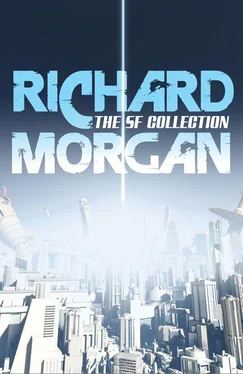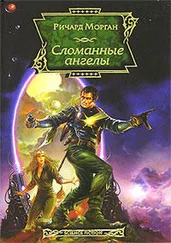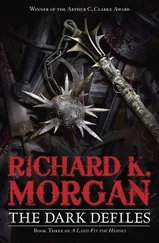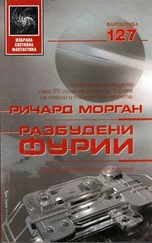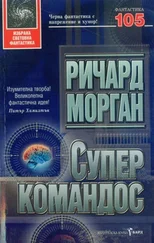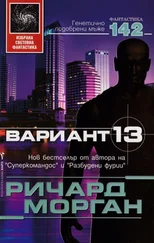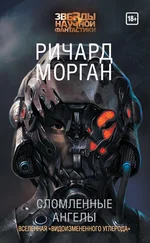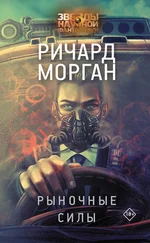The bridge was not much more user-friendly than the path that led to it. The materials used in its construction didn’t look to have been renewed in decades, and where the planking had cracked and holed, the locals had placed rocks so there was no downward view into the water that might scare the mules which were still the only viable means of heavy transport down from the towns on the canyon rim. Infrastructural neglect was a general feature of the region – significant distance from the nearest prep camps meant no possible return on corporate funds deployed here, tourism was the only staple and the tourists liked their squalor picturesque – but here the process had been allowed to run a little further than elsewhere. Here visitors other than known locals were not encouraged, and tour companies had been persuaded to route their itineraries away, to other sections of the canyon. Here, comings and goings on the path were watched by men carrying weapons whose black and metal angles gleamed new and hi-tech in the harsh, altiplano sun. Here, it was rumoured, there lived a witch who, lacking the normal human capacity to survive the whole of the dry season awake, must fall into an enchanted sleep before the end of each year and could only be roused when the rains came, and only then by the call and ministrations of her pistaco lover.
‘You cannot seriously be planning to go down there now .’ Norton was shaking his head, but his tone carried less disbelief than weary resignation. He seemed to have lost all capacity for shock over the previous few days.
‘Better now than later,’ Carl told him soberly. ‘The more the dust settles, the more chance Bambaren and Onbekend have to take stock, and for them I’m a big black mark in the negative asset column. They don’t know about Sevgi, but they know the work I do for UNGLA, and they know I know about Onbekend. And they’re both cautious men. Leave it long enough, they’re going to start wondering where I am, and what I’m doing. But right now, they figure I’m scrambling for cover just like everybody else.’
‘Yeah, you should be.’
‘Getting hard to hold the line, is it?’
‘No, and that’s not what I meant. I’m just saying you need to think about what you’re going to do when this is over.’
Carl stared out at the slow night-time crawl of the cross-border traffic in the checkpoint lanes. ‘I’ll worry about that when it is over. Meantime – you made me a promise.’
‘And I came running, didn’t I?’ Norton gestured around the stark, utilitarian space they had to themselves. ‘I’m sitting here, aren’t I? Not like I haven’t got other things to do, or more attractive places to be doing them.’
He had a point. RimSec immigration division was widely recognised as the shitty end of the organisation’s sprawling jurisdiction, and the unlovely interior of the observation lodge offered mute testimony. Grey pressed-carbon lockers stood ranked along the back wall, a random scatter of cheap tables and chairs crowded one half of the limited floor space and a pool table clothed in garish orange baize took up the rest. A plastic rack held the warped and battered cues pinned to the wall like suspects, alongside a couple of vending machines whose wanly glowing display windows were racked with items that looked more like hazardous material in an isolation chamber than food or drink. Bleak LCLS panels in the roof, the long window of the observation port commanding its three-metre elevated view of the traffic. An unobtrusive back door led out to the cells.
They’d been sitting there since before it got dark.
Carl got up and prowled the room for the fifteenth time. He was beginning to think he could feel the soul of the place breathing, and it didn’t improve his mood much. The yellow-painted walls were institutionally uncared for, scarred in a hundred places at the pool table end with the memory of overzealous wind-up for irritable, jaw-rattling shots. Elsewhere forlorn-looking posters attempted to break up the monotony, everything from RimSec information flyers and mission statements to soft porn printout and announcements of local gigs and fiesta nights at clubs up the road in Blythe. None of it looked very appealing, less so than ever the fifteenth time around.
It wasn’t much of a place to say his farewells to Norton.
‘NYPD still giving you a lot of grief?’ he asked.
Norton gestured. ‘Sure, they’re pushing. They’d like to know where the hell you are, that’s for sure. Why you walked out like that. I’ve got you down as officially helping COLIN with its internal investigation, witness protected as part of the deal. They don’t buy it, but hey, they’re just cops. They don’t get to argue with us about stuff like this.’
‘They ask about anything else?’
The COLIN exec looked away. He’d never asked what Carl had found to do in Manhattan the rest of that day. ‘No, they haven’t. Why, is there something else I should know about?’
Carl gave the question a moment’s honest consideration. ‘That you should know about? No. Nothing else.’
The death of NYPD sergeant Amy Westhoff had made some headlines across the Union, he’d checked for it, but he doubted Norton had the spare time or energy to make any connection there still might be with Sevgi Ertekin. Four years was a long time, and he was pretty sure he’d covered his tracks when he called Westhoff. The woman’s guilt had done most of the heavy lifting for him.
‘If I’m honest,’ said Norton tiredly, ‘I’m more worried about the Weill Cornell people than the police. There’s some serious finance lying about in that place, some people with access to high-level ears, and some seriously dedicated medical staff who don’t like losing their patients under mysterious circumstances. Not to mention the fact that the Ortiz family’s personal physician has a consultant residency there.’
‘Did you have to pay off the crash team?’
‘No, they’re not the problem. They’re all juniors, looking to build careers, and they know what a malpractice suit can do to a résumé, even by association. I had them pronounce Ortiz dead at the scene, and then chased them out, told them it wasn’t their responsibility any longer. You should have seen their faces – they were all very relieved to get out of that room.’
Carl paused by a gig listing. Fat Men are Harder to Kidnap – Blythe Mars Memorial Hall, November 25th. Nearly three weeks away. He wondered briefly where he’d be when the Fat Men took the stage. Put the thought away, barely looked at.
‘Got an exit strategy for Ortiz yet?’
Norton peered into the dregs of coffee gone two hours cold. ‘Variations on a theme. Unsuspected late-stage viral contamination from the bioware slugs he was shot with. Or interface incompatibilities, his body rejected the nano-repair suite he was implanted with and he was too weak to survive the shock. Either way, you can be damn sure there’ll be no post-mortem worth worrying about. Joaquin Ortiz is going to get a statesman’s funeral, eulogies over a tragic untimely death, and his name on a big fucking plaque somewhere. None of this is ever going to come out. That’s how we buy the family’s silence.’
Carl gave him a curious look from across the room. Something had happened to Norton since he’d seen him last, something that went beyond the weary lack of capacity for surprise. It was hard to pin down, but the COLIN exec seemed to have taken to his new role as the Initiative’s fixer with a bitter, masochistic pleasure. In some obscure way, like a driven athlete with pain, he looked to be learning to enjoy the power he’d been handed. In the vacuum vortex created by the death of Ortiz and his brother, Tom Norton was the man of the hour, and he’d risen to it like a boxer to the bell, like the reluctant hero finally called to arms. As if, along with the young patrician demeanour and the studied press-conference calm, this was just part and parcel of what he’d been made for after all.
Читать дальше
